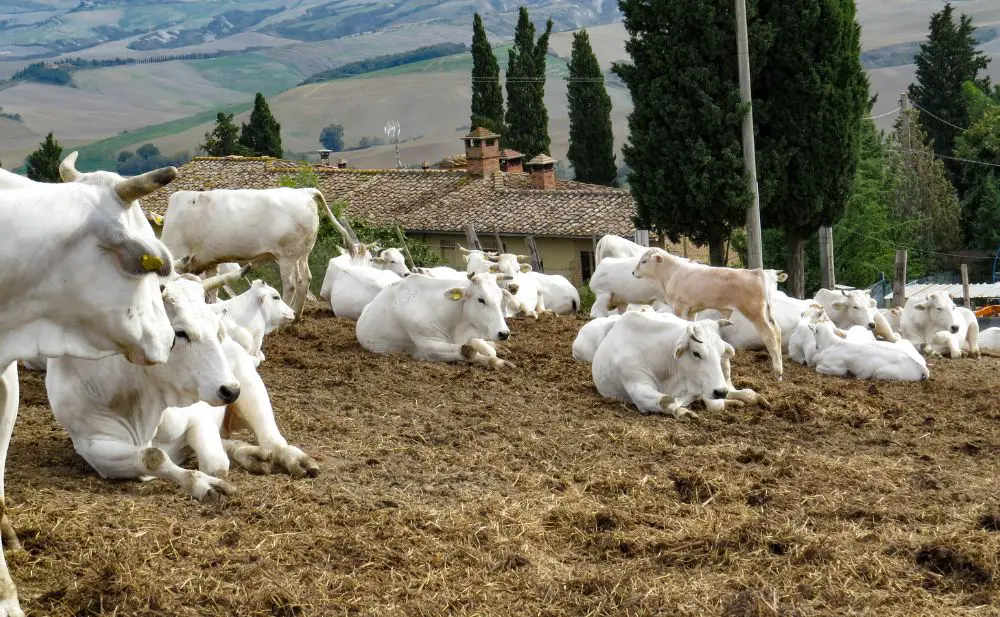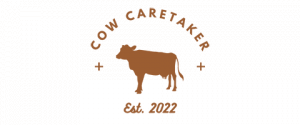Chianina cattle are an Italian breed and one of the oldest breeds of cattle in Europe. Chianina oxen are well known for their use as draft animals, but the Chianina cattle of today are primarily used for meat production.
This article will help you decide if this is the right breed for your farm.
Table of Contents
Where Does Chianina Cattle Come From?
Chianina cattle are originally from Valdichiana in central Italy and date back to the days of the Romans, nearly 2000 years ago. Statues from this time depict Chianina cattle being used in the fields, and slaughtered as sacrifices.
The highest amount of purebred Chianina cattle in the 21st century reside in Siena and Arezzo. They weren’t exported to other countries until after the conclusion of WWII.
Chianina semen was first introduced to America in the late 1960’s and the first live calves were imported from Canada following the standard livestock quarantine period in the early 1970’s.
In 1972, the American Chianina Association was founded to maintain a herd book. The association was interested in using Chianina in composite programs and had successful results when they crossbred Chianina with Angus to produce the Chi-Angus breed.
They subsequently went on to produce the Chi-Ford, which is a cross between Hereford and Chianina as well as the Chi-Maine, which is a cross between Chianina and Maine Anjou.
Today, over 300,000 head of cattle are registered in America alone. The Chianina breed continues to have a strong presence in the beef industry throughout the world and are highly regarded for their excellent genetics and conformation.
Chianina Breed Characteristics
| Official Breed Name | Chianina Cattle |
| Scientific Name | Bos taurus |
| Origin | Italy |
| Appearance | Large, well-muscled, short hair white and grey cattle with black pigmented skin, and short horns |
| Calf Weight | 110lbs |
| Mature Cow Weight | 1750lbs to 2200lbs |
| Mature Cow Height | 5’5” |
| Mature Bull Weight | 2500lbs to 3800lbs |
| Mature Bull Height | 5’11” to 6’7” |
| Ready To Breed | 14 to 16 months |
| Gestation Period | 10 months |
| First Calvings | 2.6 years |
| Time to Slaughter | 19 to 20 months |
| Carcass Weight | 1025lbs |
| Expected Lifespan | 20 years |
| Productive Lifespan | 5+ years |
| Known For | Well-defined muscling and beef production Use in composite programs The largest bovine in the world in terms of height and weight |
| Weaknesses | Small udders limiting milk production Reach puberty at a later age |
| Climate | Have high heat tolerance Not suited for cold climates |

What Is So Special About Chianina Cattle?
Chianina cattle are both the tallest and heaviest cattle in the world, with the world record for weight being held by a Chianina bull named Donetto who clocked in at 3,840lbs in 1955.
The weight and strength of these cattle make them ideal for both draft and beef production purposes.
Beef Production
Chianina cattle are known for high-quality lean meat with heavy musculature yielding a higher than average dressing percentage (65%) than many other beef cattle.
Chianina beef is more expensive than similar products of other beef breeds, and has a reputation for quality. It is the only beef used in Tuscany to make a proper beefsteak Florentine style (bistecca alla fiorentina), with the meat coming as a T-Bone cut from a Chianina calf.
Chianina has a high lean meat-to-fat ratio when compared to Continental breeds and have excellent genes that reduce fat waste in calves.
Draught Cattle
When used as draught cattle, they are non-aggressive, submissive to people and have the ability to take direction well.
They have high endurance with extremely strong legs which enables them to perform a number of farm-related purposes.
Why Should I Raise Chianina Cattle On My Farm?
- Easy to handle breed with excellent temperament
- Adaptable to hot climates, and able to withstand humidity
- They are in high demand as terminal sires and used extensively in crossbreeding programs due to their size
- Able to forage and thrive on low-quality grass and vegetation
- Chianina cows have excellent mothering instincts
- Chianina cows are likely to calve multiples and don’t typically have difficulty calving
- Rarely suffer from genetic disorders and disease
- Hardy breed that is resistant to parasites
- Chianina have a short, smooth coat with white hair
- Crossing Chianina with British breeds increases growth rates and increases hybrid vigor
- Resistant to both pinkeye and eye cancer due to pigmentation around eyes
- Great for both small-scale and large-scale farming operations
